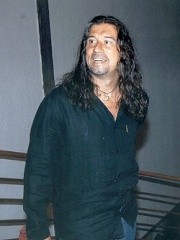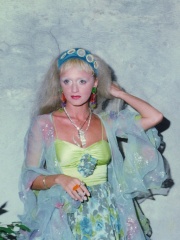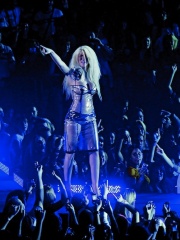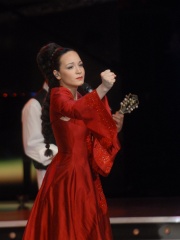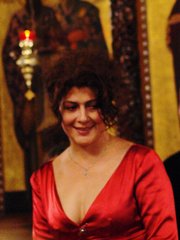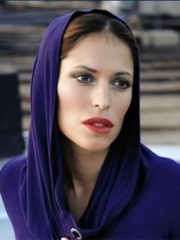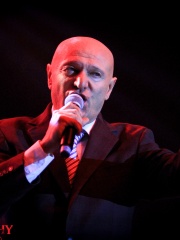
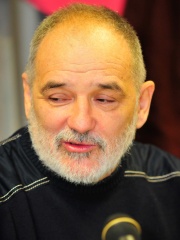
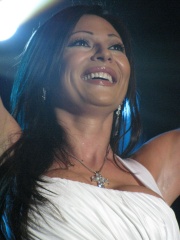
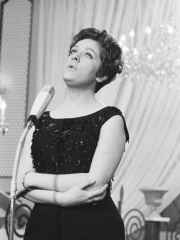
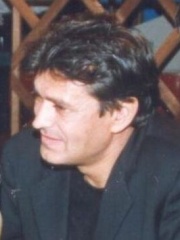
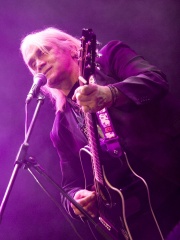
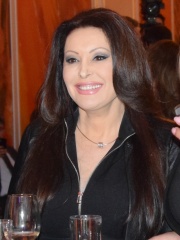

The Most Famous
SINGERS from Serbia
Top 10
The following people are considered by Pantheon to be the top 10 most legendary Serbian Singers of all time. This list of famous Serbian Singers is sorted by HPI (Historical Popularity Index), a metric that aggregates information on a biography's online popularity. Visit the rankings page to view the entire list of Serbian Singers.

1. Šaban Šaulić (1951 - 2019)
With an HPI of 65.01, Šaban Šaulić is the most famous Serbian Singer. Her biography has been translated into 22 different languages on wikipedia.
Šaban Šaulić (Serbian Cyrillic: Шабан Шаулић; 6 September 1951 – 17 February 2019) was a Serbian and Yugoslav folk singer. Renowned for his refined baritone vocals and performances characterised by emotional intensity and crowd interaction, his career spanning over five decades has enjoyed both critical and commercial success. He is referred to as the "King of Folk Music" ("kralj narodne muzike").

2. Đorđe Balašević (1953 - 2021)
With an HPI of 63.76, Đorđe Balašević is the 2nd most famous Serbian Singer. His biography has been translated into 30 different languages.
Đorđe Balašević (Serbian Cyrillic: Ђорђе Балашевић; 11 May 1953 – 19 February 2021) was a Serbian singer and songwriter, writer, poet and director. He began his career in the late 1970s as a member of the band Rani Mraz, transitioning after two albums to a solo career. He first gained mainstream prominence for writing Rani Mraz's hit "Računajte na nas" (Count on Us), which was often described as the anthem of a generation. Noted for his vivid lyricism and poetry, Balašević was also known for weaving political commentary into his songs and live performances. Broadly supportive of South Slavic unity in the late 1970s and early 1980s, in the lead up to the Yugoslav wars he began to criticise the authorities. During the Yugoslav wars, he became a prominent anti-war voice in the region, thanks to which he also became a UNHCR Goodwill Ambassador. Balašević was the first Serbian act to perform in Sarajevo following the siege of Sarajevo. Balašević became one of the most prominent critics of Slobodan Milošević's regime, at considerable personal risk. Balašević was a prolific singer and writer, he recorded 14 albums and wrote 8 books during his career and has been characterised by media and commentators as a "musical legend" and author of many "evergreen hits".

3. Ceca (b. 1973)
With an HPI of 62.62, Ceca is the 3rd most famous Serbian Singer. Her biography has been translated into 36 different languages.
Svetlana Ražnatović (née Veličković; Serbian Cyrillic: Светлана Ражнатовић, née Величковић; pronounced [sʋětlana raʒnǎːtoʋit͡ɕ]; born 14 June 1973), better known as Ceca (Serbian Cyrillic: Цеца, pronounced [t͡sěːt͡sa]), is a Serbian singer. Dubbed the "Serbian Mother" ("srpska majka"), she made her recording debut in 1988 and has collectively released sixteen studio albums. She is recognized the most commercially successful Serbian artists of all time with collective sales of seven million records. Furthermore, with 150,000 attendees, her 2013 concert in Ušće, Belgrade was one of the highest-attended concerts in the world. In 2023, Ražnatović also became the youngest recipient of the Life Achievement Award at the Serbian Folk Music Assembly. She has been described as a regional music star, and of the most popular names in Balkan music. From 1995 until his assassination in 2000, Ceca was married to Serbian mobster and paramilitary leader Željko "Arkan" Ražnatović, with whom she had two children, including fellow singer Anastasija. In 2011, Ceca was convicted of embezzlement and illegal firearm possession.

4. Lola Novaković (1935 - 2016)
With an HPI of 62.60, Lola Novaković is the 4th most famous Serbian Singer. Her biography has been translated into 27 different languages.
Zorana "Lola" Novaković (Serbian Cyrillic: Зоранa "Лола" Новаковић); (25 April 1935 – 3 April 2016) was a Serbian singer, hugely popular during the 1960s and to a lesser degree the 1970s. She was born in Belgrade, Kingdom of Yugoslavia. She represented FPR Yugoslavia at the Eurovision Song Contest in 1962, where she finished fourth. In 1962, she starred in Šeki snima, pazi se, a full-length comedy inspired by the public persona of football sensation Dragoslav Šekularac. She died on 3 April 2016, at age 80.
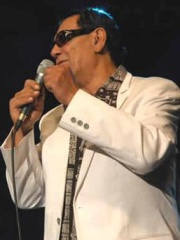
5. Šaban Bajramović (1936 - 2008)
With an HPI of 62.08, Šaban Bajramović is the 5th most famous Serbian Singer. His biography has been translated into 16 different languages.
Šaban Bajramović (Serbian Cyrillic: Шабан Бајрамовић, pronounced [ʃǎban bajrǎːmɔʋitɕ]; Romani: Shaban Bajramovičh; 16 April 1936 – 8 June 2008), nicknamed Šabi (Шаби), was a Serbian vocalist and recording artist of Arlije Romani ethnicity. He was one of the most internationally critically acclaimed Romani singer-songwriters. Due to his eminent impact on music in Eastern Europe, he was dubbed the "King of Romani music".

6. Sinan Sakić (1956 - 2018)
With an HPI of 59.58, Sinan Sakić is the 6th most famous Serbian Singer. His biography has been translated into 16 different languages.
Sinan Sakić (Serbian Cyrillic: Синан Сакић; 13 October 1956 – 1 June 2018) was a Serbian pop-folk singer. Sakić first reached massive popularity as a member of the Yugoslav turbo-folk band, Južni Vetar (Southern Wind). He also went on to have a successful career as a solo artist. Sakić was one of the most successful artists in the ex-Yugoslavia region.

7. Bora Đorđević (1952 - 2024)
With an HPI of 58.51, Bora Đorđević is the 7th most famous Serbian Singer. His biography has been translated into 20 different languages.
Borisav "Bora" Đorđević (Serbian Cyrillic: Борисав, Бора Ђорђевић; 1 November 1952 – 4 September 2024), also known as Bora Čorba (Serbian Cyrillic: Бора Чорба), was a Serbian rock musician, singer-songwriter and poet. He was best known as the frontman of the rock band Riblja Čorba.

8. Dragana Mirković (b. 1968)
With an HPI of 58.21, Dragana Mirković is the 8th most famous Serbian Singer. Her biography has been translated into 22 different languages.
Dragana Mirković (Serbian Cyrillic: Драгана Мирковић, pronounced [drǎɡana mǐːrkɔ̝v̞it͡ɕ]; born 18 January 1968) is a Serbian pop-folk singer and entrepreneur. She rose to prominence in the eighties as a member of the popular collective Južni Vetar. Mirković is recognised as one of the most successful artists from the former Yugoslavia, with collective sales of 10 million records. Alongside her husband, she also founded a satellite music channel called DM SAT.

9. Marija Šerifović (b. 1984)
With an HPI of 57.75, Marija Šerifović is the 9th most famous Serbian Singer. Her biography has been translated into 55 different languages.
Marija Šerifović (Serbian Cyrillic: Марија Шерифовић, pronounced [mǎrija ʃerǐːfovitɕ]; born 14 November 1984) is a Serbian singer. Born in Kragujevac, she is best known for winning the Eurovision Song Contest 2007 in Helsinki, Finland with "Molitva", becoming Serbia's first and to date only winning entry. Šerifović made her recording debut in 1998 and has released six studio albums as well as numerous standalone singles. Additionally, she served as a judge on the Serbian reality-TV singing competition Zvezde Granda between 2015 and 2025. She has won the Artistic Marcel Bezençon Award for "Molitva" and two regional MAC Awards. Predominately recognized for balladic songs, Šerifović is often regarded as one of the best female pop vocalists in Serbia.

10. Emina Jahović (b. 1982)
With an HPI of 57.71, Emina Jahović is the 10th most famous Serbian Singer. Her biography has been translated into 47 different languages.
Emina Jahović (Serbian Cyrillic: Емина Јаховић, pronounced [emǐːna jâːhovit͡ɕ]; born 15 January 1982) is a Serbian singer. Born and raised in Novi Pazar, she made her recording debut in 2002 and has released six studio albums: Tačka (2002), Radije ranije (2005), Vila (2009), Metamorfoza (2014), Dalje (2018) and Svitanje (2025). Outside her singing career, Jahović starred as Lale Taşkıran Ilgaz in the television series Lale Devri, between 2010 and 2014. She also served as a judge on the singing competitions X Factor Adria (2013) and Rising Star Türkiye (2016).
People
Pantheon has 26 people classified as Serbian singers born between 1935 and 1993. Of these 26, 19 (73.08%) of them are still alive today. The most famous living Serbian singers include Ceca, Dragana Mirković, and Marija Šerifović. The most famous deceased Serbian singers include Šaban Šaulić, Đorđe Balašević, and Lola Novaković. As of April 2024, 2 new Serbian singers have been added to Pantheon including Princ od Vranje, and Divna Ljubojević.
Living Serbian Singers
Go to all RankingsCeca
1973 - Present
HPI: 62.62
Dragana Mirković
1968 - Present
HPI: 58.21
Marija Šerifović
1984 - Present
HPI: 57.75
Emina Jahović
1982 - Present
HPI: 57.71
Goran Karan
1964 - Present
HPI: 54.80
Bebi Dol
1962 - Present
HPI: 52.22
Jelena Karleuša
1978 - Present
HPI: 49.66
Milan Stanković
1987 - Present
HPI: 49.37
Stoja
1972 - Present
HPI: 48.14
Jelena Tomašević
1983 - Present
HPI: 47.85
Princ od Vranje
1993 - Present
HPI: 46.94
Divna Ljubojević
1970 - Present
HPI: 46.18
Deceased Serbian Singers
Go to all RankingsŠaban Šaulić
1951 - 2019
HPI: 65.01
Đorđe Balašević
1953 - 2021
HPI: 63.76
Lola Novaković
1935 - 2016
HPI: 62.60
Šaban Bajramović
1936 - 2008
HPI: 62.08
Sinan Sakić
1956 - 2018
HPI: 59.58
Bora Đorđević
1952 - 2024
HPI: 58.51
Ksenija Pajčin
1977 - 2010
HPI: 47.93
Newly Added Serbian Singers (2025)
Go to all RankingsOverlapping Lives
Which Singers were alive at the same time? This visualization shows the lifespans of the 7 most globally memorable Singers since 1700.

